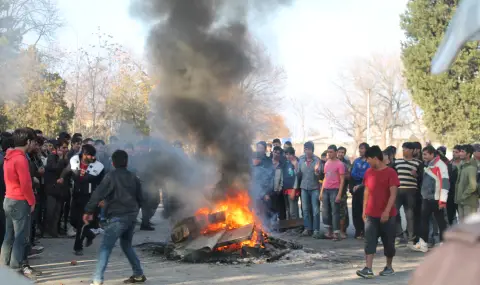"Violence in Bulgaria is becoming an end in itself," says Stefan Reichel, chairman of the organization "Mateo", which helps migrants in Germany. "Once the police have started beating, they will continue to do so. And the authorities in Sofia tolerate the violence - the more brutal it is, the greater the expected deterrent effect", commented the human rights defender to the German "Tageszeitung". (TAC).
"Refugees are being beaten in Bulgaria, including women and children"
Reichel visits Bulgaria to see for himself whether the stories of Syrians and Afghans about the inhumane treatment of them in Bulgaria correspond to reality. "Their stories are true. After this trip, I am more convinced than ever", he emphasizes. Stefan Reichel and his colleagues talk to NGOs, lawyers and many migrants. They also visit some of the refugee camps in Bulgaria.
In Harmanli, they see disastrous conditions - despite the new director's attempts to improve the situation. "I think it has about 3.02 euros per refugee per day. There's not much for him to do," commented Reichel. In the closed centers - in Lyubimets and Busmantsi - the situation is even more serious. "The violence at the border continues afterwards in the prisons, especially in Busmantsi near Sofia," the human rights defender claims. And he adds: "In the center in Lyubimets, near the Turkish border, which we only saw from the outside, violence is a daily occurrence. There is one container there without video surveillance where refugees are being beaten, including women and children."
According to him, one of the big problems is that there are criminals among the migrants. There are also people who know nothing but violence and war. And they often have to coexist with everyone else. "And over 95% of Syrians are certainly not criminals. On the contrary: they are often the ones who suffer because they have to live with such people."
"They sleep on the benches and find it difficult to find work"
The visit of the Germans to Bulgaria was also provoked by the current debate in Germany about the extradition of refugees under the Dublin Agreement, according to which they must be returned to the countries where they first entered the territory of the EU. The debate on the topic became heated after the terrorist attack in Soligen in August. It turned out that the perpetrator was actually supposed to be deported to Bulgaria. CDU/CSU chancellor nominee Friedrich Merz is pushing for migrants to be returned. But what would await them in Bulgaria?
"We should not forget that these people have their own history. "Almost all of them have experienced push-ups, arrests, beatings, prisons and camps, which seriously burdens them," says Stefan Reichel. Those who have already been denied status are either "deported directly or remain in prison for up to 18 months, sometimes even longer," explains the German human rights activist. And the people who have the right to reside in Bulgaria, such as the Syrians for example, are simply sent away upon their arrival and end up either on the street or - if they are lucky - with friends and relatives. The German says that he saw many refugees sleeping in the parks - for example, in the garden in front of the Central Bath next to the "Banya Bashi" mosque. in Sofia. "There are almost no legal job opportunities. This requires, for example, a permanent address. "Whoever is young and skilled can eventually make some money as a hired worker on the black market," explains the human rights activist.
Regarding the violence against migrants, Stefan Reichel summarizes: "If Germany broadcasts a signal that it considers this normal, the relevant authorities in Bulgaria will naturally also consider it normal". And so the violence along the border will continue.
